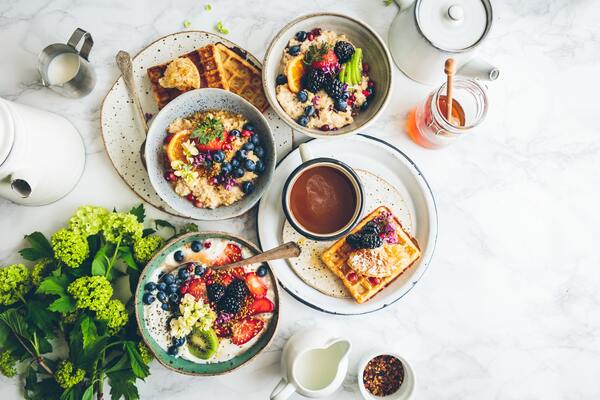In the Spring, we are gifted with more sunlight, warm weather, and a feeling of vitality; making this a season that we happily welcome. As a time that signifies new beginnings, some regard the Spring as the most transformative season, simply because they feel the most “themselves”. With more sunlight, comes more serotonin (the chemical that is associated with boosting your mood), and with more serotonin comes the natural ability to be a little more optimistic, a little more centered, and a little more present. It seems as though during the Spring, our foundation [in life] is centered around joy & vitality; and this only peaks in the following season of Summer; but Summer is over… and we’re in the midst of Autumn, and if you are a regular reader of the wellness sector of this platform then you know why this is important to say.
Over the last month, New York Gal spoke to some of the most influential [new] faces in wellness; about the transition that we are all forced to face when entering Autumn. Between less sunlight, colder weather, and the overall moral lowering each day, Autumn is regarded as a time of rest; because for most people, there’s simply nothing left to give. For most people, the transition from Summer to Autumn is the most complex; because in the midst of adjusting to Autumn, we are faced with a major setback, Daylight Savings.
In one of our most recent articles, we explained what the significance of this event is, and who is affected; but we never spoke about how to combat it, and that’s why we’re here today. If you’re a longtime reader, then you may have read our 2019 article How Daylight Savings Affects Your Body; and if you haven’t, go check it out. Throughout this article, we not only speak about its effects, but we provide tips on how to cope; and in this article, we will be providing an updated version of that, giving 2 essential tips.

TIP #1 – Creating A [New] Routine.
Perhaps the most essential (even influential) tip for combatting the effects of Daylight Savings is by giving yourself a routine [based on your current needs]. During the summer, it is easy to forget small tribulations whether they’re external or internal. Distractions such as spending time with friends, basking in the fresh air, or reinventing ourselves allow us to be present, even if that means ignoring all the dirty work.
Checking in with ourselves and others (mentally & emotionally), making time for work & passions, and yes, creating routines that’ll guide us throughout our day(s); they are all a part of the “dirty work” that we often forget. According to Piedmont Healthcare, which is a recognized leader in delivering expert care, the benefits of routine include starting your day off right, making better decisions, sleeping better, having more useful personal time. In our last interview, we spoke to mental health advocate Priscilla Agymen on some of her go-to winter routines & she had this to say:
“Cook nutrient-dense, warm foods that will improve your gut health and fill you up. Refill your prescriptions, design your autumn/winter self-care routines as I’m sure it’ll look much different than the warmer months. Connect with your community, invite your loved ones over (safely) for biweekly dinners and potlucks. Schedule FaceTime dates with your friends. Read some fiction, exercise your imagination. Find a new hobby you don’t have to monetize. Remember you’re not alone. Loneliness can literally kill us, so centering your community is important at this time.”
For more ideas, read our article Improve Your Morning Routine with These 8 Tips.

Tip #2: Be Intentional About Food.
In our original article, we briefly explain the benefits of eating correctly during the Spring; but it’s important that you remember the psychological link between the foods we eat and our mental health. Last month, we spoke to holistic nutritionist Arielle Simone about this link & even spoke about her using her personal platform to help educate others on what they should eat, her saying this
“I think both the 1-Month and 3-Month programs are perfect for any time of the year but the Autumn season is really good because we’re going to be eating more seasonal produce. More root vegetables. More foods that keep us warm and grounded. Along with lifestyle habits to help with anxiety, mood swings, and depression which all seem to sky-rocket once the weather starts getting colder and our days start getting shorter. Also, the program is perfect for building a healthy gut and immune system so as to fight off any inflammation or infections.“
If you aren’t sure where to start, root vegetables can include sweet potatoes, white potatoes, kale, and pumpkin. If you need recipes, look at this article provided by Healthline, a medical website that allows readers to learn more about a health condition, research medication, and get tips for healthier lifestyles.
Summary:
With the ending of Daylight Savings, comes a set of trials & tribulations; but there is also room for re-invention. If these two tips tell you anything, they should tell you that it’s okay to be flexible with yourself. You have options, and you have the chance to see what fits and what doesn’t fit your personal standards. Be intentional with the choices you make, especially now; because it is during this time that being intentional is the most apparent. We may not have the vitality and encouragement from our environment anymore, but we have it within ourselves, and nothing is more important than that.
Read More:
Entering Autumn: The Inspiration & The Aftermath
NYG Meets: The Founder of Saddie Baddies, Priscilla Agyeman
Entering Autumn: Meet Podcaster, Author & Mental Wellness Advocate, Patience Tamarra
NYG Gal Meets: Creative Entrepreneur & Wellness Brand Founder, Sabrina Abdalla
Entering Autumn: Meet Mineral Specialist & Spiritual Wellness Advisor Libramoonstone


